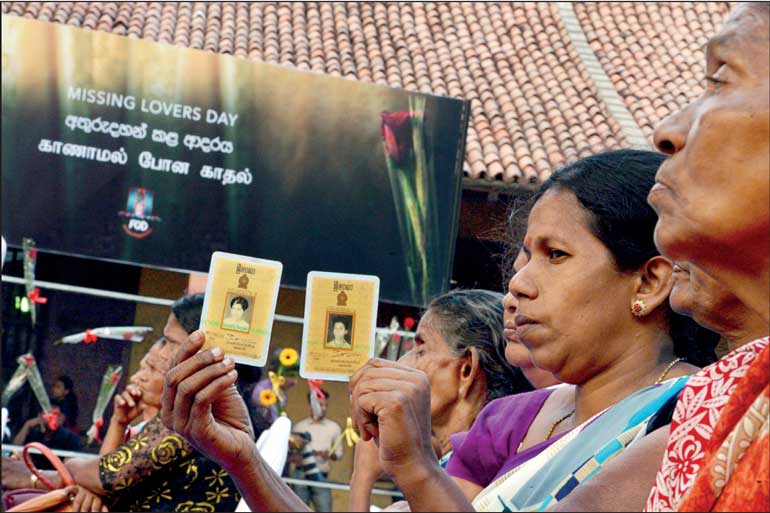Monday Feb 16, 2026
Monday Feb 16, 2026
Wednesday, 17 January 2024 00:25 - - {{hitsCtrl.values.hits}}

As long as impunity prevails, SL will achieve neither genuine reconciliation nor sustainable peace - UN Deputy High Commissioner of Human Rights
 The Government has published a Bill to establish the Commission for Truth, Unity and Reconciliation in Sri Lanka in the Gazette of 29 December, 2023 that was issued on January 1, 2024. The Foreign Affairs Minister discussed this initiative with a group of civil society, and it was once again discussed during the preparation of the Bill.
The Government has published a Bill to establish the Commission for Truth, Unity and Reconciliation in Sri Lanka in the Gazette of 29 December, 2023 that was issued on January 1, 2024. The Foreign Affairs Minister discussed this initiative with a group of civil society, and it was once again discussed during the preparation of the Bill.
We had Presidential Commissions of Inquires such as, the Udalagama Commission in 2006 to investigate and inquire into alleged serious violations of human rights arising since 1 August, 2005; the C.R.De Silva Commission in May 2010 on Lessons Learnt and Reconciliation (LLRC); and the Paranagama Commission in August 2013 to investigate Complaints of Abductions and Disappearances, in respect of the armed ethnic conflict that ended in 2009.
All these commissions were established under the Commissions of Inquiry Act, by the President. However, the recommendations were hardly implemented.
The following was stated by the UN Deputy High Commissioner of Human Rights during the oral update at the 53rd session of the Human Rights Council in June 2023.
“The announcement of plans for a Truth Commission or similar reconciliation mechanisms requires attention. Sri Lanka has witnessed too many ad hoc commissions in the past that failed to ensure accountability. The Office on Missing Persons has not achieved the results that provide satisfaction to victims. What is needed is a coherent plan that connects the different elements of truth, redress, memorialisation, accountability and creates the right enabling environment for a successful and sustainable transitional justice process. Accountability remains the fundamental gap in attempts to deal with the past. As long as impunity prevails, Sri Lanka will achieve neither genuine reconciliation nor sustainable peace.”
Under the recommendations of the UNHRC resolution A/HRC/51/5 in October 2022, it was stated as follows:
“Prepare a comprehensive strategy on transitional justice and accountability, with a time-bound plan to implement outstanding commitments, including taking steps in relation to the establishment of a credible truth-seeking mechanism and an ad hoc special court, as well as security sector reform and vetting, and re-energise the Office on Missing Persons and the Office for Reparations to ensure that they can discharge their full mandate independently and effectively.”
The LLRC recommended conducting investigations and prosecuting offenders and justified it as follows:
“It is also the obligation of the Government to clear the good name and protect the honour and professional reputation of soldiers who defended the territorial integrity of Sri Lanka and particularly the many thousands of soldiers who perished carrying out their combat duties cleanly and professionally against a widely condemned terrorist group that used most inhumane tactics in combat. Offences if any, of a few cannot be allowed to tarnish the honour of the many who upheld the finest traditions of service.”
From Presidential commissions to Parliamentary Act
Therefore, the intention of the Government is to address all outstanding issues that were repeatedly emphasised by many. It is a switch from presidential commissions of inquiries of which the implementation of the recommendations was not acceptable, to a Parliamentary Act with wider scope and a mechanism of implementation of the recommendations.
The objective of the Sri Lankan Bill according to Section 12(1),is that the Commission shall investigate, inquire, and make recommendations in respect of complaints, or allegations, or reports relating to damage or harm caused to persons or property, loss of life or alleged violation of human rights anywhere in Sri Lanka, that were caused in the course of, or reasonably connected to, or consequent to the conflict that took place in the Northern and Eastern Provinces during the period 1983 to 2009, or its aftermath.
In Section 12(2) it was stated that subject to the provisions of subsection (1), the mandate of the Commission includes several points that were described in sub sections running from (a) to (l).
Sub section (h)(xii) is as follows: “Investigating and making recommendations in respect of the allegations of damage or harm caused to persons or property or loss of life or alleged violation of human rights referred to in subsection (1), including making findings in regard to those responsible for the commission of the alleged violations and abuses referred to in subsection (1), including those who advised, planned, directed, commanded or ordered such atrocities.”
The Commission can refer matters to the relevant law enforcement or prosecuting authorities of Sri Lanka for further investigation and necessary action, where it appears to the Commission that an offence or offences punishable under the Penal Code(Chapter 19) or any other law of Sri Lanka has been committed (Section 13 zd).
According to Section 16(2), it shall be lawful for the Attorney-General to institute criminal proceedings in a designated court of law in respect of any offence based on material collected in the course of an investigation or inquiry or both, as the case may be, by the Commission established under this Act. This content was also in Section 24 of the Commissions of Inquiry (Amendment) Act No 16 of 2008.
Therefore, the provisions of the Bill are in line with the thinking of the UNHRC and LLRC in relation to accountability.
Truth and Reconciliation Commission of South Africa
In South Africa, The Truth and Reconciliation Commission was established by the Promotion of National Unity and Reconciliation Act No 34 of 1995. The main objectives of the South African Commission was to establish the complete picture of nature, causes and the extent of gross violations of human rights during the specified period, facilitating the granting of amnesty to persons who make full disclosure of the relevant facts, establishing and making known the fate of victims by granting them an opportunity to relate their own account of violations, and compiling a comprehensive report with recommendations to prevent the future violations of human rights.
SL Bill fundamentally different to South African Act
We can discern that the objective of the Sri Lankan Bill is fundamentally different to the South African Act. In South Africa no party has denied that atrocities were committed and both parties to the conflict admitted that. South Africa wanted to heal their wounds and move forward. Hence, the concept of revealing the truth followed by amnesty came in.
The term of the commission is five years and it could be extended by another 2 years. The provisions of the Bill are action oriented. The criticisms of the fate of the previous Presidential Commissions of Inquiries were addressed in the Bill and remedial actions taken.
After submitting the interim reports biannually or the final report to the President, the Commission should release those to the media in all three languages and within 21 days the President should table it in Parliament (Section 15). Within one month from the date of publication of the first interim report, the President shall establish a Monitoring Committee to monitor and facilitate the implementation of the recommendations of the Commission (Section 39).
The Monitoring Committee shall consist of five ex-officio secretaries to specific ministries and six members recommended by the Constitutional Council and appointed by the President. The Committee shall submit bi-annual reports to the President every six months, evaluating the efforts of the Government and the efforts of any other person or body concerned to implement the recommendations of the Commission and other previous Commissions of Inquiry and the President shall table such reports in Parliament not later than two weeks from the receipt of such report (Section 40).
Finally, Parliament may take cognisance of the recommendations based on interim reports or the final report, as the case may be, and pass such resolution it may consider necessary to promote national unity and reconciliation (Section 16).
It seems the President and the Government are making reforms in a slow and steady manner not only in the economic front but also in the political front, although there are widespread concerns about some of the actions of the President. Once the President attempted to implement the 13 Amendment to the Constitution in full. There was criticism against him that attempting unpopular reforms on both fronts simultaneously would be detrimental in a future election. However, it appears this is not a concern for him.